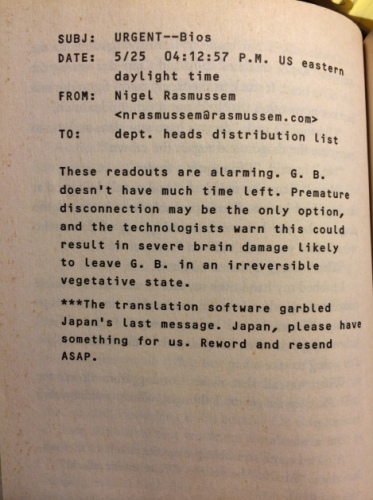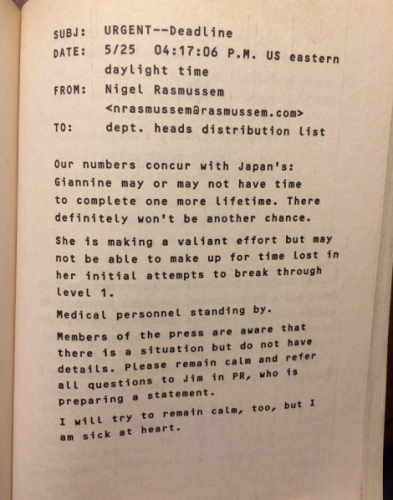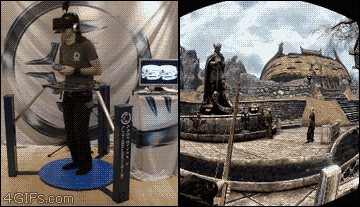Hello my field daisies!
My yoga instructor, Tony Mar, has taught me a lot of things, one of which is the joy of revisiting your favorite things. Whether it be your favorite yoga pose, movie, song, novel, etcetera, you always gain something new from redoing, rewatching, relistening and rereading. With that in mind, I decided to reread one of my favorite childhood books, Heir Apparent.
I love sci-fi and fantasy novels. Mostly because these books take my mind on a journey, showing me potential glimpses of the future. You never know what to expect, and as a child these were the perfect books to let my imagination roam free.
Heir Apparent was written in 2002, and is about a 14 year old girl named Giannine Bellisario who receives a fifty dollar gift certificate to Rasmussem Enterprises from her father for her birthday. Rasmussem Enterprises is a gaming center that has everything from old timey arcade games to immersive role playing fantasy games. Giannine decides to spend her money on a role playing fantasy game called Heir Apparent, where the king has died and named his illegitimate child his successor. The player is the illegitimate child, and in order to win the game, he or she must survive the two days before he or she is crowned. Throughout the game, the player must deal with a jealous queen and half brothers, barbarians, a dragon, an army of ghosts and many other deliciously fun hurdles. Now all this would be fine and dandy until CPOC protestors (Citizens to Protect Our Children) decide to ransack the place and damage the equipment. Now Giannine can no longer be unplugged and has to successfully complete the game in order to exit the program. So the book is essentially like a time looping movie such as Groundhog’s Day, and whenever Giannine dies she is sent back to the beginning of the game. I suppose if you wanted to you could just start the book at ch. 22 “Did Someone Say Deja Vu?” the part where Giannine begins playing her successful round that gets her out of the game. But that’s no fun. It’s more fun to see all the bad choices she made in the beginning so that you can relish in the satisfaction of all her good choices.
A thing that I noticed differently when reading it this time is the Rasmussem interoffice emails that are slipped in between the chapters. I skipped over reading these as a kid because of the boring font and technical jargon.
But now I realize that these emails add to the suspense of the novel, acting to disrupt the flow of the virtual reality by showing the crisis happening in the actual reality. The times on the emails also reveal that the hours passing in the virtual reality are mere minutes in actual reality.
Now in 2014, virtual reality seems less like a sci fi plot ploy. Though still in its development phases, we may soon see virtual reality games go mainstream.
In sci fi novels and movies, virtual reality consoles are people in encapsulated pods hooked up to various tubes. In real life, virtual reality consoles are more clunky with big headsets and headphones that give you a wide field view and real live sound. Controllers are still not universally decided on. In the gif below you see someone running on a circular pad with Wii-like controllers, but some virtual reality consoles still use the standard controllers.
This video by the Verge elegantly sums up virtual reality, its developments, drawbacks and future. One of the drawbacks is simulation sickness caused by latency. If one were to swivel his or her head too quickly, this could be very jarring and disorienting.
Oculus Rift seems to be on its way to solving this problem. Its potential for usage beyond gaming has interested Facebook, which just purchased Oculus Rift for 2 billion dollars. Here’s Mark Zuckerberg’s personal statement on the matter.
Virtual reality could drastically change the way we consume media. Imagine being able to walk through the Louvre Museum and see the Mona Lisa, all from the comforts of your home, or imagine teleconferencing your business partners in China and feel as if they were in the room with you, “just by putting on goggles in your home” (quote from Zuck’s personal statement).
This line of thinking could lead to total immersion and obsession with the digital world. Why actually go to the Louvre and deal with crowds of tourists when you can do the same thing virtually and have the whole museum to yourself?
I don’t think virtual reality will completely overtake reality. Instead I think it’ll enhance reality like augmented reality is already doing. Augmented reality is not immersion, rather it is the integration of digital with the real world.
In his Ted Talk, Chris Kluwe, former NFL punter, talks about how augmented reality is the future of sports.
Fans want to know what it feels like to be their favorite players, which is why the video game Madden NFL is so popular. Google Glasses could bring a whole new perspective to the football watching experience, the perspective of the players themselves.
Augmented reality could also change the pace of the game and how the game is played.

Imagine if players no longer had to memorize a playbook. They could just have the play digitally available on their visor. Quarterback helmets already have speakers built into them, so I don’t think this new technology would be challenged.
All in all, I have very excited and also fearful of all this emerging technology. The rise of virtual and augmented reality seems imminent, and this certainty and its possibilities is exciting. But the fact that big businesses such as Facebook are eager to profit off of virtual reality makes me fearful of what this new technology will do to society and the way it functions.
Just some food for thought.
Love ya’ll and thanks for reading!
Hope you have a daisyish day!





[…] Heir Apparent and the Future of Virtual Reality […]
[…] another person’s dream without their consent is violating their privacy. However with virtual reality technologies such as the Oculus Rift becoming more mainstream, I think the concept of inception, […]